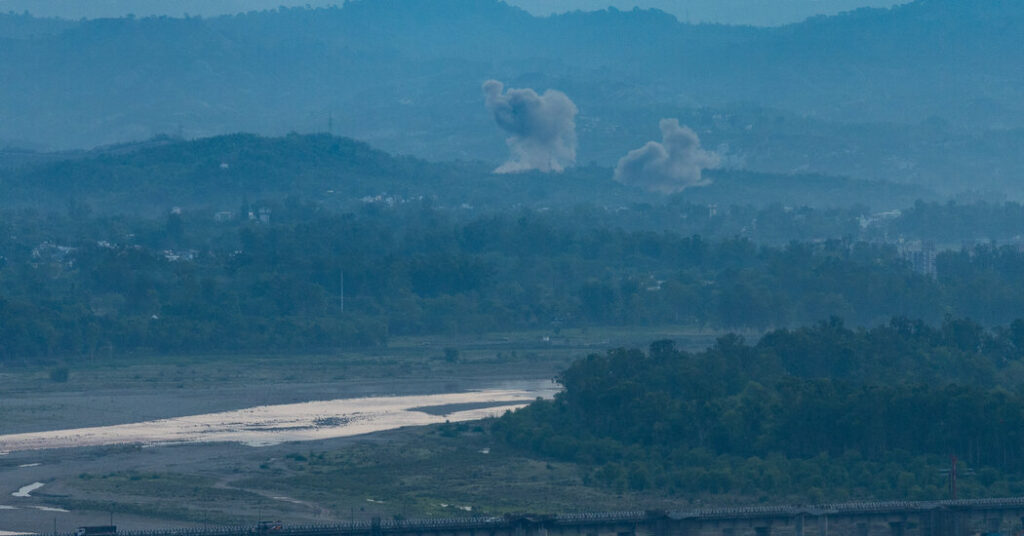The fighting between India and Pakistan intensified sharply on Saturday with both sides targeting air bases and blaming each other for striking first, as the United States again called on both sides to de-escalate.
Pakistan said India had targeted at least three of its air bases with air-to-surface missiles in the early hours of Saturday, including Nur Khan, a key air force installation near the capital, Islamabad. Witnesses in the city of Rawalpindi, where Nur Khan is located, reported hearing at least three loud explosions, with one describing a “large fireball” visible from miles away.
Within hours, Pakistan said it had retaliated using short-range surface-to-surface missiles against several locations in India, including the Udhampur and Pathankot air bases and a missile storage facility. “An eye for an eye,” the Pakistani military said in a statement.
India, however, also described its action on Saturday as retaliation. The Indian military said it had struck several Pakistani military targets, two of them radar sites, in response to a wave of Pakistani attacks on 26 locations using drones, long-range weapons and fighter planes. There was “limited damage” to equipment and personnel at four Indian air force bases, Vyomika Singh, an Indian Air Force officer, said at a news conference on Saturday.
“It is Pakistani actions that have constituted provocation and escalation,” said India’s foreign secretary, Vikram Misri. “In response, India has defended and reacted in a responsible and measured fashion.”
Amid the claims and counterclaims, it was clear that the night involved some of the heaviest military engagement from both sides since India conducted airstrikes on Pakistan on Wednesday. India has accused Pakistan of harboring terrorist groups that carried out a deadly attack on tourists last month in India-controlled Kashmir. Pakistan has denied involvement.
Both countries say that they want to de-escalate, but the crisis has spiraled into the most expansive confrontation between the two nations in a half-century, with fierce fighting along sections of their border and drone attacks and other strikes hitting deeper within each country.
Seth Krummrich, a former U.S. Army colonel, said it was the “most violent and concerning escalation” he could recall in the longstanding conflict between the two nations.
But Mr. Krummrich, now a senior executive at the private security firm Global Guardian, also said that focus mostly on military targets, and “parity in the types, levels and locations of attacks reflects that both sides are deliberately calibrating their responses,” making him cautiously optimistic. “Neither side is going for a strategic escalatory ‘kill shot.’”
India and Pakistan became separate countries in 1947 and have fought three wars, with disputes over Kashmir figuring in each. One of those wars, in December 1971, established the so-called Line of Control that divides Kashmir. But India and Pakistan are separated by an international border of around 2,000 miles, and in this conflict, each is targeting sites far beyond Kashmir.
Each military response has taken a toll on people living close to border areas; dozens of civilians have died, dozens have been injured and many homes have been damaged.
Iftkhar Ahmed, a politician from the Kashmiri border town of Rajouri, said four people died in his neighborhood after being hit by artillery fire that started on Friday night and continued into Saturday. Mr. Ahmed, like many others in the area, is used to shelling, but earlier episodes did not last very long. “This time, it was very long and intense.”
The intensifying crisis has prompted alarm worldwide and diplomatic efforts to defuse the crisis by Saudi Arabia, the United Arab Emirates, Qatar and other countries with strong ties to both India and Pakistan.
Foreign ministers from the Group of 7 industrialized nations had also urged “maximum restraint from both India and Pakistan” in a joint statement on Friday, warning that “further military escalation poses a serious threat to regional stability.”
After the heavy military exchanges on Saturday morning, Secretary of State Marco Rubio spoke with the foreign ministers of India and Pakistan, telling both that they needed to find ways to de-escalate and communicate directly to “avoid miscalculation,” according to readouts of the calls from the State Department. Mr. Rubio also offered U.S. help in starting talks between the two countries.
Ishaq Dar, Pakistan’s foreign minister and deputy prime minister, described his call with Mr. Rubio as “very reassuring.” Mr. Dar said he told Mr. Rubio that Pakistan would not escalate, but that it depended on India.
“The response we wanted to give, we’ve given it. Now the ball is in India’s court. If they stop at this point, we will also consider stopping,” Mr. Dar said on Geo News, a Pakistani television channel. “But if they strike again, we will also respond.”
Subrahmanyam Jaishankar, India’s external affairs minister, said on social media that he had spoken with Mr. Rubio on Saturday morning. “India’s approach has always been measured and responsible and remains so,” he said in the post.
With both sides blaming each other for escalation, there is no off-ramp in sight, and fears are growing among the people of India and Pakistan about what might happen next.
Hari Kumar, Suhasini Raj and Pragati K.B. contributed reporting.

